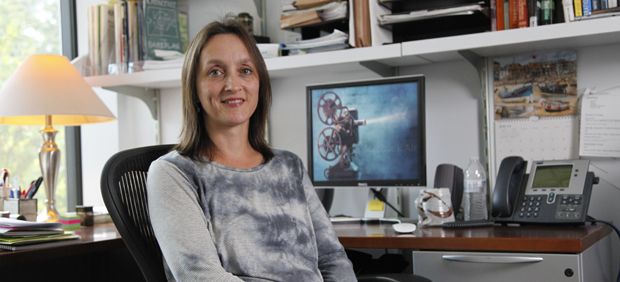Study: Emotional reactions to fiction and 'based on a true story' are about the same
Research by marketing professor Jane Ebert delves into emotional reactions to books, movies and prizes
 Photo/Mike Lovett
Photo/Mike LovettJane Ebert, assistant professor of marketing at the Brandeis International Business School, has conducted new research on the emotional impact of books, movies and prizes.
Consumers tend to think they will have a stronger emotional reaction to works “based on a true story” than fiction, but recent research conducted by Brandeis International Business School Assistant Professor Jane Ebert found reactions were surprisingly insensitive to whether the work was fiction or based on real events.
The research, conducted by Ebert and Tom Meyvis of New York University and published in the Journal of Consumer Research, measured and compared emotional reactions to experiences like watching a sad movie that is either based on real events or fictional, or winning a prize that’s given immediately or received later.
Ebert spoke with BrandeisNOW about her study.
When choosing a movie, book or television show, should consumers take into consideration whether it is based on a true story?
Consumers may be better off thinking about the movie, book or tv show as if it were based on a true story, even if it isn't. Based on our findings, that will help them anticipate their emotional reaction more accurately.
In our research, not surprisingly, consumers thought that watching a movie would be less thrilling if they knew it was completely fictional and that winning a prize would be less exciting if they had to wait weeks for it.But they were wrong. We found that experiences with "psychologically distant" events, like watching a fictional movie or winning a delayed prize, were often surprisingly powerful, producing emotions much stronger than consumers predicted.
For example, while participants predicted that they would be less excited about winning a prize if they would have to wait several weeks to collect it (rather than get it immediately), actual prize-winners were just as excited about winning regardless of when they would receive the prize.
We found similar results for other experiences, like reading tragic stories about recent or past events. While participants predicted that reading a tragic story would be a lot less impactful if the reader knew it happened a long time ago (rather than recently), actual readers felt equally sad regardless of when it happened.
What can movie studios, publishers and marketers take away from this study? Do they overvalue the concept of “based on a true story”?
Publishers and marketers are right to emphasize any basis in reality of the books or films they are trying to sell. Emphasizing realism can certainly make consumers more likely to choose those options when consumers want a more emotional experience, as consumers tend to believe that "true" stories will have a greater emotional impact than fictional stories.
However, our results also suggest that, while emphasizing realism may increase sales, the realism of a movie does not necessarily increase satisfaction for the consumers.
Does that mean consumers could be potentially missing out on good experiences because of their preconceptions about fiction?
Yes, definitely. When consumers want a more emotional experience, underestimating the emotional impact of fictional stories can lead them to choose books and movies that aren't as good, just because they are based on a true story, when in actuality a better, fictional book or movie could have more impact.
How can breaks, like commercials during television, affect a viewer's response and is it different for fictional and non-fictional content?
It depends on what viewers do during those breaks. In our research, when movie watchers were provided with breaks while watching a sad movie, they did feel less sad when they knew the movie was fictional. The breaks allowed them to think more about its fictional nature, as they had nothing else to focus on. However, if consumers are distracted by the commercials, then they probably won't feel less emotion, as they will be less able to do that additional thinking.
For movies or shows based on non-fictional content, the breaks are unlikely to weaken viewers' emotional reactions, even if viewers are able to think more about the movie's or show's content. Of course, commercials could themselves cause emotional reactions, for example making viewers laugh. But we would expect the effect of those kinds of commercials to be similar irrespective of whether the movie's or show's content is fictional or non-fictional.
Were any there any specific findings that were surprising to you?
Just like our research participants, my intuition still tells me strongly that my emotional reactions to experiences involving distant events will be much weaker than for those involving closer events, even though our research tells me that my intuition is wrong. So in that way, our results still surprise me.





